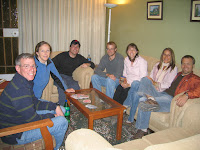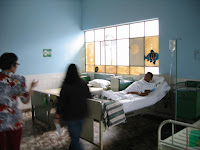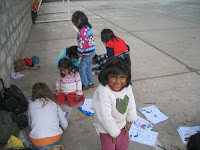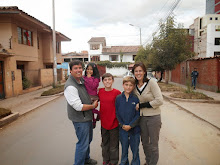30. Parades -- any time, for any reason; a great way for people to come together to celebrate.

29. The Children -- they're precious! We can't wait to welcome one or two of them into our family...SOME day!


28. Our Neighbors -- we will miss them!
 (celebrating Rick's birthday with our neighbors--
(celebrating Rick's birthday with our neighbors--they call us "Reeky", "Jainy", "Teemy" and "Bainy")
we mentioned them in a previous blog entry)
27. Jack's -- our favorite restaurant in Cusco (anywhere, for that matter)
26. The Weather -- warm during the days, cool at night, dry (apart from the rainy season, which was more occasional storms than the regular rain that we expected).
25. Los mercados -- outdoor markets with local vendors selling fresh fruit, vegetables, meat, etc.


24. City Life -- walking a lot, public transportation, and the proximity of everything.
23. English Football School -- One of the missionaries here (from England) runs a soccer program for children on Saturday mornings from 9:30am - 12:30pm. Tim has been participating for several months and loves it; Ben started playing about a month ago and has a lot of enthusiasm (smile).

22. Our Neighborhood Park -- we have spent a LOT of time there this year...

21. The Cost of Living -- very affordable for us at 3 soles/dollar. Cusco is quite expensive for the Peruvians from and living here, though, because they don't make much money.
20. Trips to Machu Picchu-- Rick and Tim with the summer school students and Rick's brother, David, in June and July, and Jen with her parents in February.



19. "Our Comfort Zone" -- being outside of it so often, living in a different culture and with more needs surrounding us, and being pushed to think about things in different ways.
18. Promesa -- the Christian, bilingual school that the boys have attended during our time here. It is run by Ron and Regina Schultz, missionaries from the U.S. who are both incredibly warm, kind people. It has been a pleasure to be part of this community during our time here.
 ( Tim with his class on his last day of school at Promesa.)
( Tim with his class on his last day of school at Promesa.) (Ben with his teachers and class.)
(Ben with his teachers and class.)17. Visits from Family and Friends -- it has been so special for us to share our "world" here with family members and friends this year. For those of you who want to come in the future, we're hoping to return every summer for Rick to teach a summer school class for 6 weeks, so don't count out the possibility!
16. Summer School -- Rick has taught his Health Care Policy and Global Health class here in Cusco to two groups of University of Richmond students in June and July. It has been a real pleasure to get to know them and introduce them to Cusco.
15. Friday afternoon soccer games at El Arca Orphanage -- we have loved getting to know the children at the orphanage and playing with them each week!

(group stretching before the game)
14. Game Nights -- the missionary community here from the U.S. and Canada get together regularly to play cards or a game of some sort. They were kind to include us -- it was a lot of fun.
13. Carts -- there are vegetable and fruit carts, snack carts, ice cream carts, and even some with appliances for sale. Some are stationary and others have a bike and wheels attached and the vendor moves around with his/her microphone saying "Papayas, mangos, platanos..." We´ve told Tim if he wants to make some extra money we can make one of these carts for him to ride around the streets of Richmond...


12. The Library at Promesa -- We arrived here last October with as many children´s books as we could add to the rest of our luggage, but we VERY quickly read those books to the point at which we were all bored. This spring, we have been extremely grateful for the opportunity to use the library at the boy´s school!
11. Friends, Part I




10. Señor Carbon -- Our other favorite restaurant in town. Great salads and vegetables and all-you-can-eat meat...plus an indoor playground for the children!
9. Local Catholic Church/Priest -- This church has been a huge blessing for us over the past several months. We love it and it´s less than a two-minute walk away. The priest is evangelical and preaches the gospel!

7. Trip to Bolivia in February -- We took a family trip to Copacabana, Bolivia -- on Lake Titicaca -- to renew our passports in February (previous blog entry). It was a blast and we have a lot of fun(ny) memories.
(right after we walked across the border into Bolivia)
(Tim and Ben on the beach in Copacabana, Bolivia)
6. Violin Lessons for Tim -- Thanks to a friend here, we knew about the excellent music school here in Cusco prior to arriving, so we were able to arrange for Tim to start immediately. He has enjoyed taking lessons all year and is now playing "Twinkle, Twinkle, Little Star" like a champ!
5. The Local Panaderia (Bakery) -- There is a wonderful bakery within a two-minute walk from our home. We have been there a lot for coffee, juices, pastries, bread, etc., and have had the chance to get to know the people who work there.
(Tim standing in front of bakery)
4. Andes Mountains/Stunning Views -- Cusco is surrounded by mountains. The views are stunning in every direction, though pictures don´t do it justice.
3. Sabbatical -- The opportunity that I, Rick, have had to finish existing research projects and start new ones. I also had the chance to start the new summer study abroad program, which would have been impossible had I not been living here.
summer school student, Giles Thompson, with children at el Arca Orphanage
2. Learning Spanish -- We do not speak perfectly, or even great for that matter, but we all have learned to understand and communicate in Spanish over the course of the year. It has been particularly fun to hear the boys become more and more confident in speaking. Rick commented that he thinks Ben can speak better Spanish than he can!
1. The Country, Culture, and People of Peru!!!!!!
--------------------------------------------------------------------
1) Peruvian driving (with all due respect to our Peruvian friends)
2) stray dogs everywhere, barking at night and pooping on the sidewalks (not sure how to phrase that differently)
3) hand-washing our laundry
4) beds that have matresses held up with boards that constantly fall out and make a lot of noise...even with lots of duck tape holding them together!
5) being so far from family and friends
6) getting out of the shower and freezing (cracks in the windows, no heat, very cold in the mornings and night)...though we really shouldn´t complain because many of the people we know don´t even have hot water!
7) exhaust from cars and trucks -- there are no regulations no car exhaust/emissions here
8) Paros ("strikes") -- these occur frequently here: roads are blocked, people protest, sometimes a little violently, and most things shut down for the day (no transportation, no school, etc.). For poor Peruvians--the majority of the population--this is the only way they can get their government in "distant Lima" to remotely pay attention to them.
9) The postal service and Peruvian bureaucracy, in general.









































































